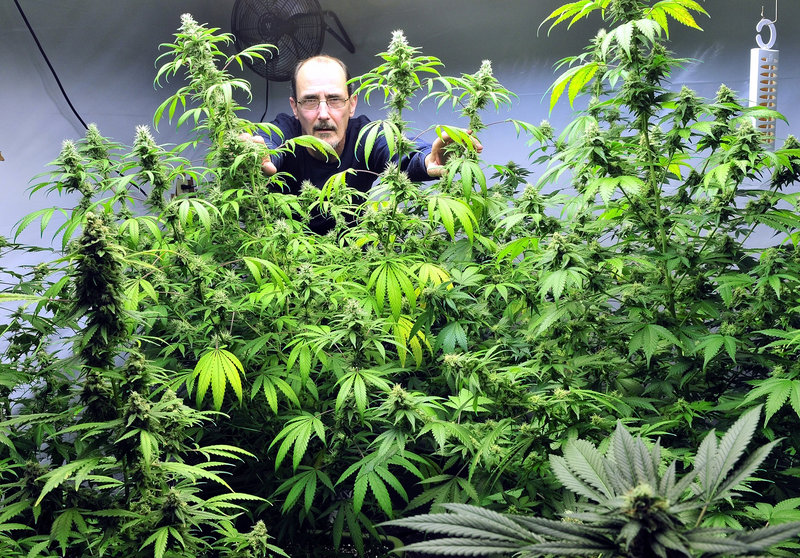Don LaRouche says he has a right to continue growing and smoking marijuana in the trailer he rents in Madison with the assistance of a Section 8 voucher.
He hopes to convince one more MaineHousing commissioner of that on Tuesday.
The board of commissioners voted 4-3 last month not to allow the use, possession or cultivation of medical marijuana in apartments subsidized through the Maine State Housing Authority’s Section 8 program. The board agreed, however, to hear additional comments at its meeting Tuesday morning.
At the beginning of October, the housing authority notified six tenants, including LaRouche, that they would have to comply with the agency’s new policy within a month or lose their vouchers.
It was something that LaRouche had heard in the past.
LaRouche, who uses marijuana to treat muscle spasms and symptoms of glaucoma and Crohn’s disease, got a letter last summer telling him to lose the marijuana or lose his housing assistance.
When he smokes marijuana, he said, “I don’t sit there and twitch, and I don’t feel like my eyes are popping out of my head.”
LaRouche, who has been growing marijuana for five years, tends to his plants daily and smokes throughout the day. On disability, he can’t afford the prices that dispensaries charge, and he can’t afford an apartment without assistance.
“I just don’t know what to do. For the people to say I can’t have something that helps me, who are them people?” he said.
LaRouche used to live in an apartment building in Madison, where he also got rental assistance, but growing pot was never a problem, he said. Then, in the spring, he moved into a rented trailer.
“All of a sudden, I can’t do it no more,” he said.
Late in the spring, an inspector reported to the state housing authority that a subsidized unit had two rooms full of marijuana plants, said the agency’s spokeswoman, Deborah Turcotte.
She couldn’t say whether that was LaRouche’s trailer, but that was when the authority’s board began to talk about its policy on medical marijuana. Before then, it was considered on a “case-by-case basis,” Turcotte said.
Around the same time, state Rep. Deborah Sanderson, R-Chelsea, who sponsored a bill last year that loosened Maine’s medical marijuana law, heard of LaRouche’s situation. She asked MaineHousing officials to give him more time before evicting him. The agency ended up rescinding its demands on LaRouche at the time.
Sanderson will join LaRouche and Alysia Melnick, an attorney for the American Civil Liberties Union of Maine, at the board meeting at 9 a.m. Tuesday. They hope the board will reconsider its decision last month. If it doesn’t, Melnick said, the ACLU of Maine will consider its legal options.
“This is, as far as I’m concerned, a law against poor people,” Sanderson said.
Although all public housing authorities are required to deny applicants who use medical marijuana, those agencies in the 17 states where medical marijuana is legal are allowed to make their own policies for people who are already in public housing and use medical marijuana, according to a memo issued last year by the U.S. Department of Housing and Urban Development.
“Unfortunately, HUD’s been a tad wishy-washy on the subject,” said Susan Eldridge, interim executive director of Westbrook Housing. “It makes it hard for us.”
Westbrook Housing and the Portland Housing Authority don’t permit any marijuana in their rental units.
Eldridge and Mark Adelson, executive director of the Portland Housing Authority, cited the conflict between state law and the federal government, which doesn’t recognize medical marijuana as a legal drug and which funds the housing programs.
Westbrook Housing plans to discuss its policy on medical marijuana further at a meeting this month.
Turcotte said last month’s decision by the MaineHousing board was based on the fact that marijuana is illegal under federal law. She said the board was also concerned that allowing medical marijuana in its apartments would burden the authority’s staff, which isn’t qualified to determine whether marijuana is being grown or used legally.
In the past six months, she said, the agency has become aware of six tenants who were growing medical marijuana in subsidized housing. They will have to remove it to keep their vouchers.
Neither Turcotte nor Melnick knew how many medical marijuana users are in the Section 8 program in Maine. They also did not know about the policies of housing authorities in other states where medical marijuana is legal.
Rhonda Siciliano, the public affairs officer for HUD in New England, said that may be because Maine’s public housing is unlike that in most other states, where all assistance is administered by local housing authorities, which can set their own policies.
Staff Writer Leslie Bridgers can be contacted at 791-6364 or at: lbridgers@pressherald.com
Send questions/comments to the editors.




Success. Please wait for the page to reload. If the page does not reload within 5 seconds, please refresh the page.
Enter your email and password to access comments.
Hi, to comment on stories you must . This profile is in addition to your subscription and website login.
Already have a commenting profile? .
Invalid username/password.
Please check your email to confirm and complete your registration.
Only subscribers are eligible to post comments. Please subscribe or login first for digital access. Here’s why.
Use the form below to reset your password. When you've submitted your account email, we will send an email with a reset code.